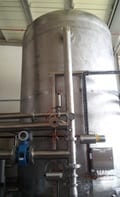Veolia Water Technologies South Africa, part of Veolia, the global leader in optimized resource management, has been awarded its third major project at Retail Brands Interafrica’s (RBI) Wadeville factory, near Johannesburg, to bring overall treated throughput at the site’s South Plant to 120 m3 per hour.
Originally designed and built by Veolia in 2006 to provide process and manufacturing water for the bottling of Pepsi, the plant underwent its first major upgrade in 2010 to increase the hourly throughput of 60 m3 by 50% – enough to cater for the company’s new Ceres Fruit Juice production plant. The latest upgrade, awarded mid-2013, will improve output to 120 m3 per hour, and will be commissioned before the plant’s peak production run for the December festive season. Veolia’s Project Engineer, Hirsheda Jeram, provided details: “This latest upgrade was envisaged when we planned the first upgrade in 2010, so we factored most of the requirements into our original designs. However, since 2010, RBI has experienced significant growth, and the planned capacity needed to double in order for them to meet their demands. We accommodated for this increased demand by designing a much larger filtration unit than initially specified.” Veolia is working closely with RBI to integrate and commission the latest upgrade without affecting day-to-day manufacturing.
High-end, food-grade water for global brands
Veolia has completed installations for PepsiCo internationally, providing experience to ensure that plants are designed and built to maximise both efficiency and ease of operation. Experience in the local market has also ensured that plants are able to cater for specific requirements in terms of the local environment.







